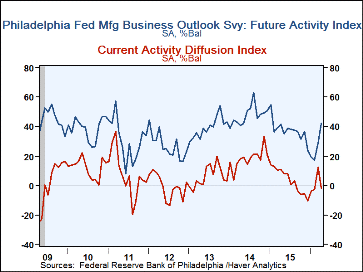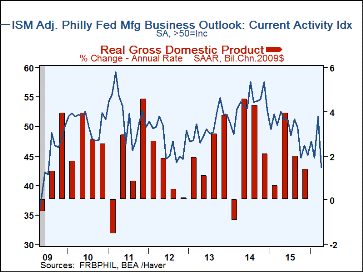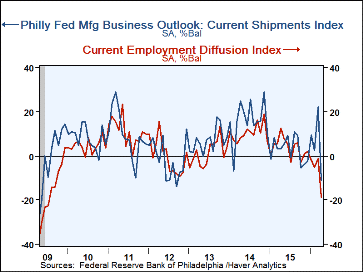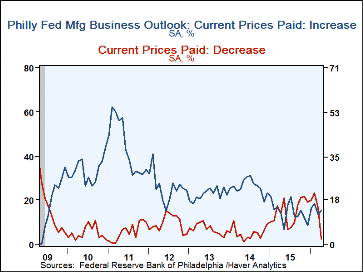 Global| Apr 22 2016
Global| Apr 22 2016Philadelphia Fed Business Conditions Index Deteriorates
by:Tom Moeller
|in:Economy in Brief
Summary
The Philadelphia Federal Reserve reported that its General Factory Sector Business Conditions Index declined during April to -1.6 from an unrevised 12.4 in March. It reversed improvement during the prior two months. The decline [...]
The Philadelphia Federal Reserve reported that its General Factory Sector Business Conditions Index declined during April to -1.6 from an unrevised 12.4 in March. It reversed improvement during the prior two months. The decline compared to expectations for 8.5 in the Action Economics Forecast Survey.
The ISM-adjusted General Business Conditions Index constructed by Haver Analytics fell sharply to 43.1 from 51.7. It was nearly the weakest reading since the economic recovery began in 2009. This figure is comparable to the ISM Composite Index. During the last ten years, there has been a 71% correlation between the adjusted Philadelphia Fed Index and real GDP growth.
Deterioration in Philadelphia Fed index contrasts with improvement in the Empire State reading, released last week. Each of the component series weakened. The shipments index declined to -10.8, the first negative number since December, following sharp improvement in March. New orders similarly fell to neutral after its jump to 15.7. Following modest improvement in March, the employment index collapsed to -18.5 from -1.1, and was the weakest reading since July 2009. During the last ten years, there has been an 81% correlation between the jobs index and the m/m change in manufacturing payrolls. The unfilled orders, delivery times and inventory figures also eroded. The length of the average workweek shortened significantly.
On the pricing front, the prices paid index jumped, showed inflation for the first time since August. Fifteen percent of respondents paid higher prices, while 2% paid less. The prices received measure increased sharply to the highest level since December 2014.
The future business activity index surged to the highest point since January 2015. New & unfilled orders both increased sharply, along with shipments and employment. Expected capital expenditures were little-changed following sharp improvement in March.
The survey panel consists of 150 manufacturing companies in Federal Reserve District III (consisting of southeastern PA, southern NJ and Delaware.) The diffusion indexes represent the percentage of respondents indicating an increase minus the percentage indicating a decrease in activity. The ISM adjusted figure, calculated by Haver Analytics, is the average of five diffusion indexes, new orders, production, employment, supplier deliveries and inventories with equal weights (20% each). Each diffusion index is the sum of the percent responding "higher" and one-half of the percent responding "same."
The figures from the Philadelphia Federal Reserve can be found in Haver's SURVEYS database. The Action Economics figure is available in AS1REPNA.
| Philadelphia Fed - Manufacturing Business Outlook Survey (%, SA) | Apr | Mar | Feb | Apr'15 | 2015 | 2014 | 2013 |
|---|---|---|---|---|---|---|---|
| ISM-Adjusted General Business Conditions | 43.1 | 51.7 | 44.7 | 52.6 | 49.4 | 53.7 | 50.0 |
| General Factory Sector Business Conditions | -1.6 | 12.4 | -2.8 | 10.8 | 3.6 | 18.3 | 6.1 |
| New Orders | 0.0 | 15.7 | -5.3 | 6.0 | 2.9 | 14.9 | 7.2 |
| Shipments | -10.8 | 22.1 | 2.5 | 3.4 | 3.0 | 16.1 | 6.8 |
| Unfilled Orders | -6.3 | -1.9 | -12.7 | -2.7 | -5.1 | 3.3 | -3.9 |
| Delivery Time | -9.9 | 0.3 | -16.1 | 4.5 | -4.1 | 0.6 | -4.1 |
| Inventories | -20.5 | -12.7 | -17.1 | 4.1 | -1.5 | 1.7 | -3.5 |
| Number of Employees | -18.5 | -1.1 | -5.0 | 12.5 | 3.9 | 10.5 | 1.4 |
| Prices Paid | 13.2 | -0.9 | -2.2 | 1.3 | 1.5 | 21.6 | 16.4 |
Tom Moeller
AuthorMore in Author Profile »Prior to joining Haver Analytics in 2000, Mr. Moeller worked as the Economist at Chancellor Capital Management from 1985 to 1999. There, he developed comprehensive economic forecasts and interpreted economic data for equity and fixed income portfolio managers. Also at Chancellor, Mr. Moeller worked as an equity analyst and was responsible for researching and rating companies in the economically sensitive automobile and housing industries for investment in Chancellor’s equity portfolio. Prior to joining Chancellor, Mr. Moeller was an Economist at Citibank from 1979 to 1984. He also analyzed pricing behavior in the metals industry for the Council on Wage and Price Stability in Washington, D.C. In 1999, Mr. Moeller received the award for most accurate forecast from the Forecasters' Club of New York. From 1990 to 1992 he was President of the New York Association for Business Economists. Mr. Moeller earned an M.B.A. in Finance from Fordham University, where he graduated in 1987. He holds a Bachelor of Arts in Economics from George Washington University.
More Economy in Brief
 Global| Feb 05 2026
Global| Feb 05 2026Charts of the Week: Balanced Policy, Resilient Data and AI Narratives
by:Andrew Cates










